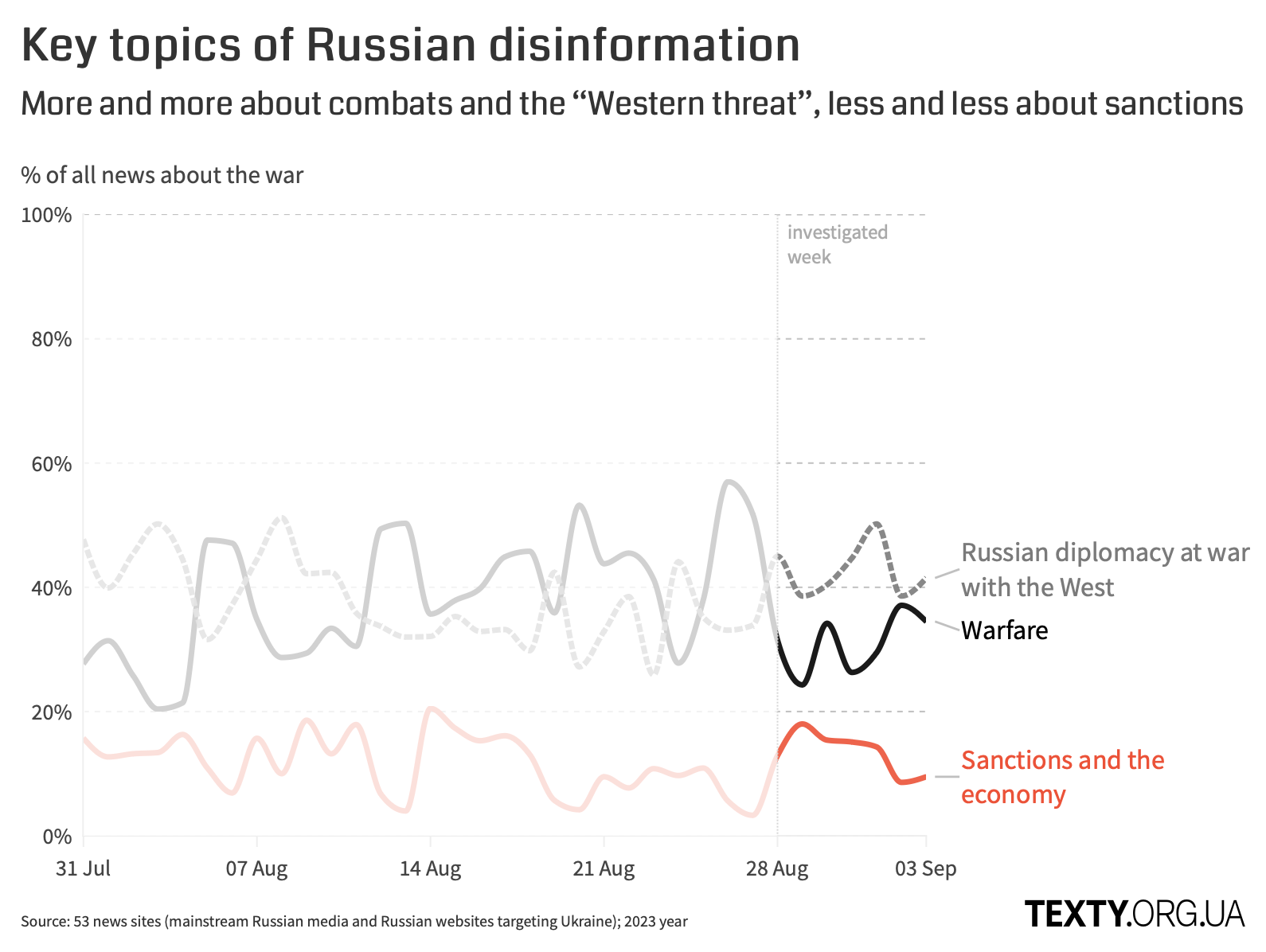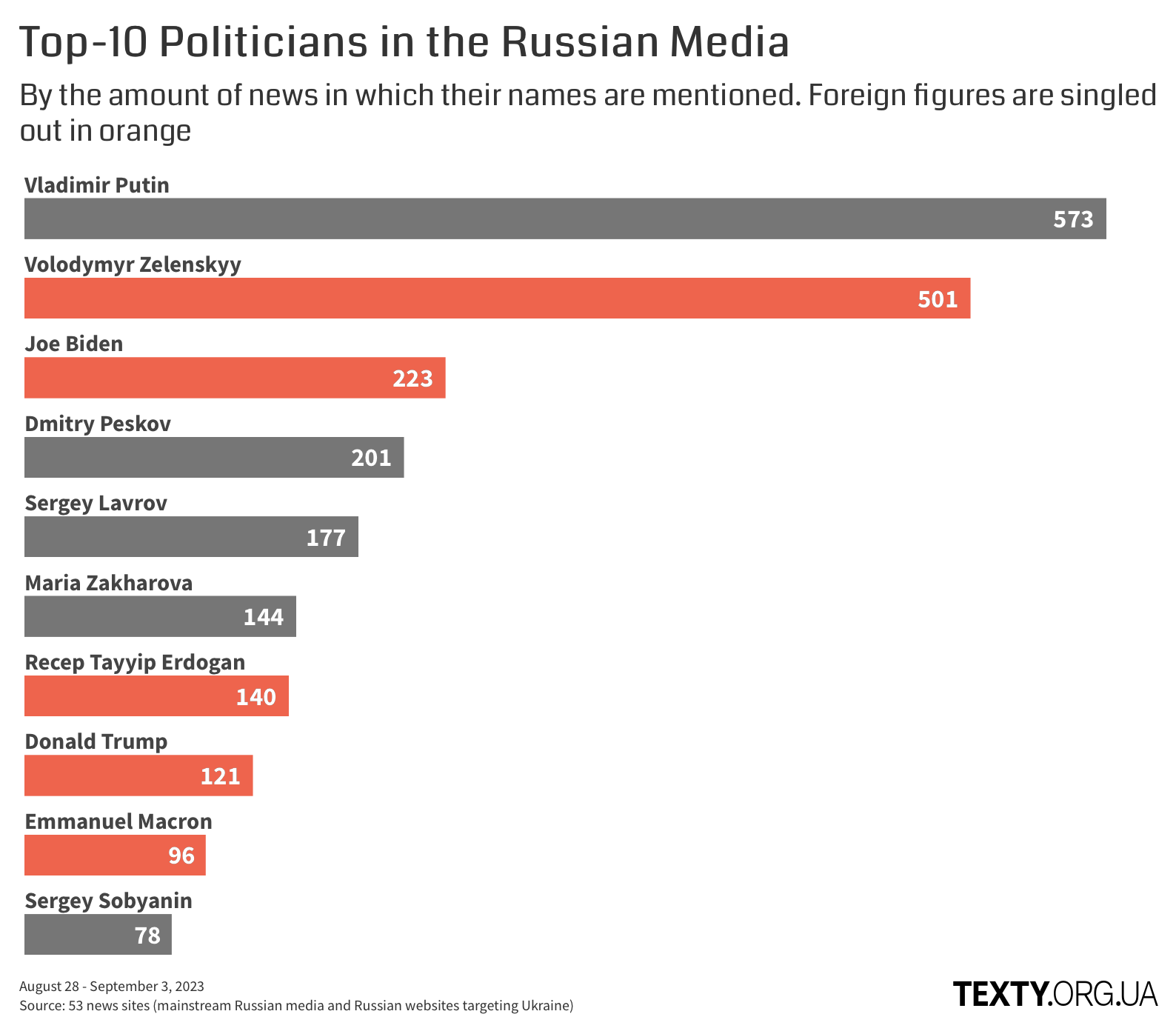Flank Attack: Ukraine Hits Pskov from the Baltics. Russian Media Monitoring Report, 28 August – 3 September 2023
After a two-month hiatus, we are finally back with our weekly monitoring reports on Russian propaganda.
Last week, Russian media gloated over the failures of Ukraine's counteroffensive.
The propagandists cherish the dreams of taking Kharkiv and Zelenskyy dying from the hand of his own military. Ukraine’s latest drone attack on the Pskov military airfield took the Russians by surprise. The disinformation media faced the tough challenge of explaining how the drones had sneaked past the air defenses. Soon enough, there were plenty of versions including the assistance of a Baltic state.
Follow the trending topics of Russian disinformation on our interactive dashboard “Disinformation about the War in Ukraine”

Russian officials also accused Tokyo of aggressive militarization and voiced concerns over Japan's contribution to the nuclear contamination of the world ocean. Even the Day of Knowledge in Ukraine received propagandist treatment. Instead of sympathizing with Ukrainian children whose schools had been destroyed by the Russian army, they scared their audiences with tales about Little Banderites’ — the children who are allegedly being indoctrinated with the hatred of Russia from the early years.
This monitoring report covers these and other topics of the disinformation spread by Russian state media and online para journalists to manipulate public opinion.
Ukrainian Drone Strikes: from Lithuania to Pskov
Last week's demonstration of Ukraine's long-range strike capabilities shocked Russian propagandists. On the night of 30 August, Ukraine conducted a UAV attack on the Kresty air base in Pskov where airborne troops and their Il-76 transport aircraft were stationed: “The drone attack on Pskov airport caused an unspecified number of Il-76 military transports to catch fire”. Although Kyrylo Budanov, the Chief of the Main Directorate of Intelligence of the Ministry of Defense of Ukraine admitted that the strike had been launched from Russian territory, he remained tight-lipped regarding the assets involved in the operation.
Just like before, the attack caused a brief period of disarray in Russia since Kremlin’s information minions were out of words to explain why the glorified Russian air defenses had failed to repel a Ukrainian attack into Russia’s underbelly.
At first, Russian media assured that the attack had in fact been repelled and insisted that it was the debris of the downed UAVs that had caused the fire: “Earlier this night, Pskov airport suffered a UAV attack. According to Mikhail Vedernikov, the governor of the region, the air defense units of the Ministry of Defense of the Russian Federation neutralized all the airborne threats. As a result, a fire broke out at the airport grounds”.
Once the photographic evidence of airport damage had emerged, the propagandists started to point fingers at the culprits and the enemy. The disinformation media which had spent months reporting on the successful demilitarization of Ukraine went out of their way to avoid admitting Ukraine's military success. Their next step was to claim that “the UAV attack on Pskov could have been launched from Latvia, Estonia, or from a vessel positioned in the Baltic sea”, “Given the distance of over 600 km between Pskov and the Ukrainian border, there was no way the drones could have entered the airspace of the region except by crossing the territory of other regions of Russia or overflying Belarus or the Baltic states”
Some so-called “experts” even called for declaring war on the Baltic states: “This attack provides casus belli — a formal reason for declaring war“.
Russian media stated categorically that “Ukrainian operators of the combat UAVs which have recently struck the territory of Russia are relying on their Western allies for the intelligence on radars and air defense systems”. However, Ukraine and its allies did not bother to provide any comments.
To distract the average Russian from the news about Ukraine's drone strikes, the propagandists are pounding their audiences with reports on Russian long-range weapons hitting Ukrainian installations: “Meanwhile, the Russian army continues launching Geran strikes. New drones have been spotted over central Ukraine by the enemy observers. According to Ukrainian monitoring channels, two attack formations of Geran UAVs are airborne”. Although Russia insists on the domestic origin of the Geran and denies any supplies from Iran, the moped-sounding UAVs are known by their real name Shakhed in Ukraine. Those news reports are being dished out in an effort to protect the population from the harsh reality and maintain the myth about Russia’s invincibility.
Things are Getting Ugly for Ukraine
The Russian media remain zealously dedicated to reporting on the Russian army's battlefield success. They keep painting a grim picture of a failed Ukrainian offensive and convincing Russians that Ukraine will never be able to turn the tide: “Ukraine’s military potential is nearly depleted. They wasted it all on the way to the village of Rabotino in Zaporozhye oblast. Kyiv has no resources to carry the momentum of the offensive and repel Russian counterattacks”.
The disinformation media are comparing Ukraine's losses to Soviet losses in Afghanistan: “Ukraine’s staggering losses spell its imminent defeat. The country lost 43,000 men and almost 3,000 armored vehicles in a matter of two months. In comparison, the Soviet army lost 15,000 men over 10 years of fighting in Afghanistan”. However, not a single word was said about Russia’s own losses in the war, and it makes a lot more sense comparing Ukraine to Afghanistan and Russia to the USSR.
The “experts” have been producing new arguments to support their claims of Kyiv's inability to put a dent in the Russian defenses. For example, they claim that modern Western weapons are no match for state-of-the-art Russian systems.
Among other things, the propagandists dream of capturing Kharkiv: “The Ukrainian army has been running out of resources and seems to be on the verge of surrendering Kharkiv to the Russian forces”.
According to the disinformation media, in addition to Russia’s victory, the failed Ukrainian offensive will lead to Zelenskyy's liquidation: “Zelenskyy may be put down by his own military”, “Once the ZSU commanders have realized the offensive fiasco, they will direct their rage at Ukraine’s president Vladimir Zelenskiy and execute him”, “According to Scott Ritter, Zelenskiy has zero chances of surviving the conflict with Russia... The expert pointed to the fact that it is Zelenskiy's pathological dependence on the attention of the West despite Ukraine's situation getting increasingly desperate that keeps the leader of the Kyiv regime at the helm”.
Japan: a New Threat
On 3 September Russia celebrates a new victory day: “3 September — Victory over Militarist Japan Day and End of World War II”. This is a recent addition to the days which glorify Moscow's military: “The new day of military glory to be celebrated on 3 September was established by the State Duma in June 2023. The law was adopted in response for Japan's unfriendly actions towards Russia”.
Dmytro Medvedev, who has long been putting his blogging aspirations first and his duties of Deputy Head of the Security Council of the Russian Federation second, could not resist the temptation of greeting Russians in his signature style — by blaming the Americans of the nuclear bombing of Japanese cities and by threatening Japan: “In his address, Mr Medvedev stressed that the nuclear bombing of Japanese cities by the United States in 1945 showed the Americans’ true colors as the US had used the weapons of such devastating power without a reasonable need”, “Dmitri Medvedev called on Japan to accept the outcomes of World War II and let them rest. “Japan has to learn some lessons from its history and ought to give up on its militarist plans for the benefit of its own people””.
Russian propagandists claim that Japan has once again become a threat for Russia: “Sadly, Japan’s government has set course on the country’s militarization. They have built their wealth on the heritage of Japan which met an inglorious end”.
However, it was not the only insult thrown at Japan by the Russian propaganda. On 24 August, 12 years after the Fukushima nuclear disaster, Japan began releasing treated radioactive water into the Pacific ocean. The decision was made after a dozen years of storing the waste at the nuclear power plant. According to IAEA, the water, which undergoes treatment and dilution prior to the release, is safe for the environment.
While ignoring IAEA expert conclusions, Russian disinformation sources claim that Tokyo “authorized the release of water full of radioactive isotopes into the world ocean”. According to the most popular version, “The situation around water pollution with radioactive isotopes after the beginning of water release from the damaged Fukushima nuclear power plant is only going to get worse. The calls to stop the spread of the hazard fall on deaf ears of the Japanese government”.
The so-called experts insist that the isotopes in the water “accumulate in the tissue of fish and other marine creatures and may lead to genetic mutations and cancer upon entering the human body”.
Finally, the propagandists have been threatening Japan's government with criminal prosecution: “We must negotiate with the Chinese and the South Koreans on bringing criminal action. The releasing of contaminated water has been banned by international marine law since the 1990s”.

Also in the News:
The propagandists ran stories about “Little Banderites” — the Ukrainian schoolchildren who are allegedly taught to hate and kill Russians from the early years: “The children of today’s Ukraine are indoctrinated with fascism and taught to hate everything Russian. Ten years from now, these children will be old enough to wage war on everyone who speaks Russian”. To add credit to this statement, they even referred to Kyrylo Budanov’s statement on future wars with Russia and the possibility of a new attack by twisting his words into a fitting sense: “The Chief of the Main Directorate of Intelligence Budanov said there would be another war with Russia in 10 years. This is when the Little Banderites, who are already singing songs about the Vankas in black body bags, might come handy”.
The Russian media ran stories about the hostile Poland which is claimed to be pursuing a policy towards:splitting Ukraine and driving a wedge into the EU relations: “Certain forces in Poland are picking fights with the Germans by blaming Polish and German politicians of anti-Polish conspiracy and appealing to all those who still wish to settle old scores. The worst thing is that many ordinary citizens come to embrace this primitive anti-German sentiment”, “As the fears of a new conflict with Moscow are high, Warsaw will try to grab a part of Western Ukraine by non-military methods”.
They also claimed that Lithuania is cherishing plans to seize a part of Ukraine. In particular, the disinformation media said that Vilnius may launch a military campaign against Belarus to re-conquer the territorial heritage of the Grand Duchy of Lithuania. Furthermore, they insist that Lithuania will have to overcome the Belarusian politicians who are currently in opposition to Oleksandr Lukashenko: “The recent trends in the development of Belarusian nationalist ideology leave no doubts that sooner or later the Lithuanians and the “zmagars” (their self-adopted name) will go head to head in a fierce battle for the heritage of the Grand Duchy of Lithuania (GDL)”. This propagandists, of course, hinted at the fact that Lukashenko, who had united Russia and Belarus, is the only guarantor of peace and stability: “While the exodus of Belarussian opposition leaders to Lithuania after the events of 2020 did set a certain trend, the real reasons of the conflict between the Lithuanian government and the “swidomy” Belarussians go back to the early days of the Belarussian independent project”.
The Methodology
The corpus contains all the publications on Russian websites and those maintained by the Russian occupation force (approximately 30,000 news items) for our weekly disinformation monitoring report. Each paragraph was processed by an algorithm which defines its topic automatically. The resulting topics (i.e. groups with similar content) were short-listed by the topics relating to the war or its consequences for Russia. The number of mentions of a certain topic was then counted for each publication. Our conclusions are based on the respective findings and the quotes from paragraphs referring to each topic.
Sites: tass.ru, russian.rt.com, lenta.ru, iz.ru, riafan.ru, regnum.ru, novosibirsk-news.net, life.ru, ura.news, vz.ru, aif.ru, news-front.info, donbasstoday.ru, nakanune.ru, trmzk.ru, newizv.ru, kommersant.ru, tehnowar.ru, slovodel.com, rosbalt.ru, ruinformer.com, sevastopol.su, polit.info, antifashist.com, expert.ru, dni.ru, naspravdi.info, politnavigator.net, ng.ru, kafanews.com, dnr-pravda.ru, kerch.fm, dan-news.info, anna-news.info, 3652.ru, politobzor.net, aurora.network, gorlovka-pravda.com, lugansk1.info, nefakt.info, rusdnepr.ru, c-inform.info, doneck-news.com, vsednr.ru, comitet.su, mir-lug.info, odnarodyna.org, time-news.net, novosti.icu, xvesti.ru, meridian.in.ua, denis-pushilin.ru, sobytiya.info


